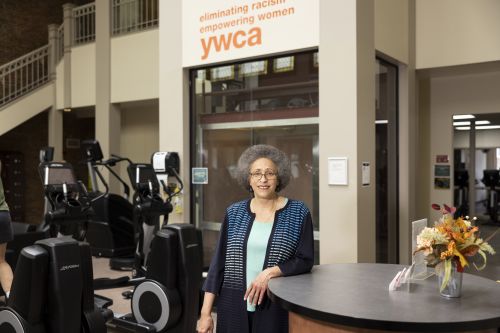Story
Propelling Nonprofits
Creative capital solutions can make good things happen
DATE
June 5, 2023

By Riham Feshir
The region is filled with nonprofit organizations solving problems to make people’s lives better. And many do this with lean budgets and stretched staff, little access to capital for projects, and a reliance on the often unpredictable ebbs and flows of fundraising. Organizations have to be adaptable and creative in getting the financial resources they need.
A few decades ago, Perspectives, which serves at-risk women and youth, had its assets tied up in the property it owned but was cash poor. So, when presented with the opportunity to purchase an apartment building in the 1990s to house more clients, Perspectives qualified for a traditional $380,000 mortgage but could not afford the cash down payment.
That’s where Propel Nonprofits stepped in.
Perspectives received a loan from Propel that served as a bridge to finance the new building. Three decades later, Perspectives has a supportive housing campus that abuts a city park, with five apartment buildings and 51 furnished apartments. The organization serves about 50 women and 80 children each year for individualized assistance and offers mental health and addiction treatment programs, as it focuses on breaking the intergenerational cycle of trauma and poverty.
“Propel shared our mission and our entrepreneurship,” says Jeannie Seeley-Smith, president and CEO of Perspectives. “We didn’t have to go through a huge amount of red tape with them. It was always, ‘How can we be there for you?’”
Multiplying Investments
Propel is an intermediary organization and federally certified community development financial institution (CDFI). It provides guidance, expertise, and capital to nonprofits. Fundamental to Propel’s work is a belief that when nonprofits are well led, well resourced, and well connected, they achieve their missions.
Propel gets its funding from financial institutions, the federal government, and foundations—including operating support from the Bush Foundation as an Ecosystem grantee. In 2017, Propel became one of the Bush Foundation’s first recipients of a program-related investment (PRI), receiving a $1 million loan at a below-market interest rate of 1% with a single principal payment due at the end of a five-year term. They paid it back in 2022.
PRIs are loans provided on more favorable terms than what might be typical in traditional lending. Those terms include lower interest rates and longer repayment schedules.
Without capital, nonprofits are continually constrained in their ability to be flexible and creative and stable. It’s also incredibly stressful for their leaders.
Kate Barr, President and CEO, Propel Nonprofits
The Bush Foundation’s PRI to Propel helped grow its overall lending pool from $25 million to $30 million. Propel used the money to make loans between $30,000 and $120,000 to nonprofit organizations in the region. Kate Barr, president and CEO of Propel, explains that in a five- to six-year period, they are able to turn a $1 million PRI into about 30 loans. “It’s going to recycle and get paid back, and we’re going to make it again. There is a real power to that,” she says.
Overall, Propel makes 120 to 150 loans of varying sizes per year. These loans can support nonprofits in a lot of ways, from managing short-term cash flow disruptions to financing building projects.
As Barr explains, “Access to capital is this additional part of the nonprofit business model that we often don’t think about. We think about bringing in revenue and paying the bills, then bringing in more revenue and paying the bills. And the cycle continues. But, essentially, if you spend all of your revenue every year—which is maybe the goal, to maximize your programming—then you never have anything left over, you can’t breathe, you can’t have a hiccup. … Without capital, nonprofits are continually constrained in their ability to be flexible and creative and stable. It’s also incredibly stressful for their leaders.”
,
Chris Romano, chief operating officer for the Bush Foundation, adds, “Propel is a great example of leveraging a PRI to expand capacity in the nonprofit community and enable organizations to do more with their resources. Our investment helps Propel support nonprofits in ways that are flexible and specific to their missions and operating models.”
Thinking Differently About Loans
The Bush Foundation has made almost $30 million in PRIs to 24 organizations in the past six years. “The communities that we serve are faced with many different challenges,” Romano says, “so for us to be creative with how we use our assets to support them is important.”
“The cool thing that happens when we receive investments like PRIs is we can try something new,” says Sarah Bauer Jackson, portfolio director with Propel. “If we’re getting money from a bank or a different investor at a higher interest rate, we have to lend it out in the way that the industry typically lends money, which doesn’t allow for a whole lot of flexibility.”
She adds, “Although we look like a bank, we differ,” and notes that Propel focuses on building relationships with the organizations it funds. It aims to think differently when it comes to repayment terms, to meet varying needs.
Jackson says that their programs have very low default rates, meaning that nearly all the nonprofits repay their loans. This suggests that many community organizations have strong financial management, even if they are not well served by more traditional lenders. When the YWCA in St. Paul needed to make critical repairs to its office buildings, plus a leaking roof in its fitness center, it turned to Propel. “Grants come on cycles, and they couldn’t be fast enough,” says Gaye Adams Massey, executive director, adding that it is hard to find a grant for a falling roof or a leaking pipe.
Propel provided the YWCA in St. Paul with a loan to make the needed repairs, as well as a line of credit, which wasn’t used, to give the organization some financial flexibility and manage any unforeseen expenses.
“We were in a better position going into COVID because of the help we got from Propel,” Adams Massey says. “Propel was more willing [than other funders] to believe in us, and we were able to build back and repaid all the loans on time.”
Propel also takes a patient and non-predatory approach to its lending. If something doesn’t go as planned, Propel’s staff works with the organizations to find solutions and can consider reducing loan payments for a while if warranted.
“We don’t want to do any harm to an organization by lending them money,” Jackson adds. “There is this fine balance of, ‘Is there a path forward and is a loan a key part of that?’ Then that’s absolutely something that we will try to do.”
Stepping Up in Crisis
When COVID-19 hit, many nonprofits wondered whether they would be able to keep their doors open. Then the federal government implemented the Payroll Protection Program (PPP) to provide loans and grants to for-profit and nonprofit businesses. There were additional state and federal funds, and other government loan resources that provided COVID-19 relief to businesses and nonprofits. Propel became a go-to resource to help nonprofits understand and access available programs.
Once those relief funds started going away, the organizations began facing a new reality. Propel saw the changing needs and innovated. They created a new product, Recovery Capital Loans, that combined working capital with partial loan forgiveness and technical assistance. The product was designed for nonprofits to “recover, rebuild, and reimagine nonprofit finances and financial stability.”
To support this innovative new product, the Bush Foundation gave Propel another $1 million PRI and a complementary $600,000 grant in 2021.
Hibo Abdi, Propel’s loan fund director, says this combination of a PRI and a grant allowed Propel to provide loans with a 25% forgivable portion—a unique and crucial piece for organizations that have been historically underfunded and that were particularly challenged during the crisis. The program gives priority to organizations led by and serving Black, Indigenous, and people of color, along with organizations serving low-income communities and clients, including rural communities.
“I’ve seen a lot of nonprofits that are making great impacts in the community that don’t have enough financial support,” says Abdi.
This innovation in a time of crisis illustrates how Propel plays a role both in understanding nonprofit needs and in helping funders find ways to meet those needs. “I love nonprofit leaders, I just do,” Barr says. “They’re the most interesting people I’ve ever known. Who did everyone turn to when they needed something in their life [during COVID-19]? They turned to a nonprofit. Nonprofits are the absolute infrastructure of community.”



Riham Feshir is a writer and content manager based in the Twin Cities. She spent more than a decade covering immigration, race and inequities in Minnesota, where she dug deep into policy decisions, developed trust with key sources and broke down complicated topics into easy-to-digest stories.
Jenn Ackerman and Tim Gruber are a husband and wife photo team living in Minneapolis, MN. Despite their work taking them around the globe they love documenting life around the Midwest. They’ve been fortunate to work regularly for clients like National Geographic and The New York Times. While the camera is a simple tool they love that it has been a catalyst for experiencing so many new things in life. When you don’t find them behind a camera you can find them going on neighborhood walks or bike rides soaking up the best nature Minneapolis and Minnesota has to offer.
Continue reading
-
News
February newsletter
Our February 2025 newsletter is full of information and resources to help people and organizations do more good in our region.
-

Paper
Lessons from our impact investing experience
The spread of impact investing among foundations is a wonderful example of our field’s collaborative nature at its best. Now we’re ready to pay it forward by sharing our approach and what we’ve learned along the way.
-

Paper
Radically Open: Contact Hub
In this paper, we share what we’ve tried and learned thus far from creating the contact hub to make us more accessible to more people.